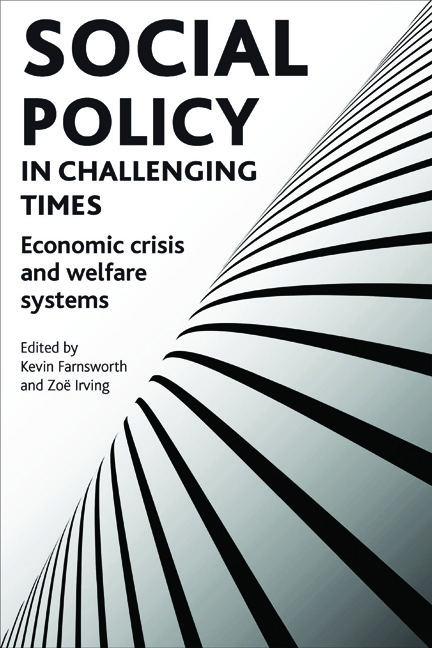Book contents
- Frontmatter
- Contents
- List of figures and tables
- Notes on contributors
- Acknowledgements
- one Varieties of crisis
- two The economic crisis and paradigm change
- three From financial crisis to fiscal crisis
- four Credit crunch, inequality and social policy
- five Global social policy responses to the economic crisis
- six Poverty, the crisis and social policy responses developing countries in developing countries
- seven South Korea after the 1997 economic crisis: a ‘paradigm shift’?
- eight China's response to crisis: what role for social policy?
- nine Tiptoeing through crisis? Re-evaluating the German social model in light of the global recession
- ten Ireland and the impact of the economic crisis: upholding the dominant policy paradigm
- eleven Waving not drowning: Iceland, kreppan and alternative social policy futures
- twelve Experiences from two financial crises in the Nordic welfare states: 1990-93 and 2008-10 compared
- thirteen Social policy and the recent economic crisis in Canada and the United States
- fourteen From economic crisis to a new age of austerity: the UK
- fifteen Responding to the challenges: some concluding remarks on welfare futures in changed circumstances
- Bibliography
- Index
eight - China's response to crisis: what role for social policy?
Published online by Cambridge University Press: 07 September 2022
- Frontmatter
- Contents
- List of figures and tables
- Notes on contributors
- Acknowledgements
- one Varieties of crisis
- two The economic crisis and paradigm change
- three From financial crisis to fiscal crisis
- four Credit crunch, inequality and social policy
- five Global social policy responses to the economic crisis
- six Poverty, the crisis and social policy responses developing countries in developing countries
- seven South Korea after the 1997 economic crisis: a ‘paradigm shift’?
- eight China's response to crisis: what role for social policy?
- nine Tiptoeing through crisis? Re-evaluating the German social model in light of the global recession
- ten Ireland and the impact of the economic crisis: upholding the dominant policy paradigm
- eleven Waving not drowning: Iceland, kreppan and alternative social policy futures
- twelve Experiences from two financial crises in the Nordic welfare states: 1990-93 and 2008-10 compared
- thirteen Social policy and the recent economic crisis in Canada and the United States
- fourteen From economic crisis to a new age of austerity: the UK
- fifteen Responding to the challenges: some concluding remarks on welfare futures in changed circumstances
- Bibliography
- Index
Summary
Introduction
The post-2007 financial crisis devastated the health of the global economy, leaving many advanced economies on the verge of financial collapse and later, in deep recession. It overshadowed even the impacts of the 1997 Asian financial crisis. Between 2007 and 2009, world growth contracted from 5.2% to –0.6%; world trade volume also plummeted from robust growth of 7.2% to a depressive figure of –10.7% (IMF, 2010f). Although not at the epicentre of the crisis, China – along with many emerging Asian economies – could not remain unscathed by the fallout of such financial failure in the West (Chhibber et al, 2009; Liu, 2009; Athukorala and Kohpaiboon, 2010). The integration of the world economic system means that the economic problems of one country or group cascade through trade, foreign investment and other transmission mechanisms into the real economies of others. Thus, the idea that China, and possibly much of Asia, was sufficiently ‘decoupled’ from the global economy to be insulated from the impact of crisis was soon shown to be unfounded (Dunaway, 2009, pp 19-23).
China was one of the first major economies to respond decisively to the crisis. It quickly introduced a massive fiscal stimulus package in an effort to reduce the negative impacts on the real economy – jobs, enterprises and growth. A critical dimension of this package was a range of social policy investments, including interventions aimed at boosting consumption and protecting the vulnerable. Such emphatic endorsement by the Chinese government of the use of social policy instruments in economic crisis management was unprecedented (Xinhuanet, 2009; Wen, 2010b), and has attracted attention both domestically and internationally (Yang and Chi, 2009; Zhang, 2009; OECD, 2010b; Tang, 2010). Its impacts and implications deserve attention.
The stimulus package came as China was already embarking on significant expansion and reform of its welfare provisions. Over recent years, China has made significant, if somewhat patchy, efforts to expand social provisions and renegotiate the shattered social contract of the ‘iron rice bowl’ era. Major initiatives include the establishment of a major social assistance programme (the Minimum Living Standard Guarantee or dibao) and an ambitious plan to achieve universal health coverage by 2020.
- Type
- Chapter
- Information
- Social Policy in Challenging TimesEconomic Crisis and Welfare Systems, pp. 139 - 158Publisher: Bristol University PressPrint publication year: 2011



